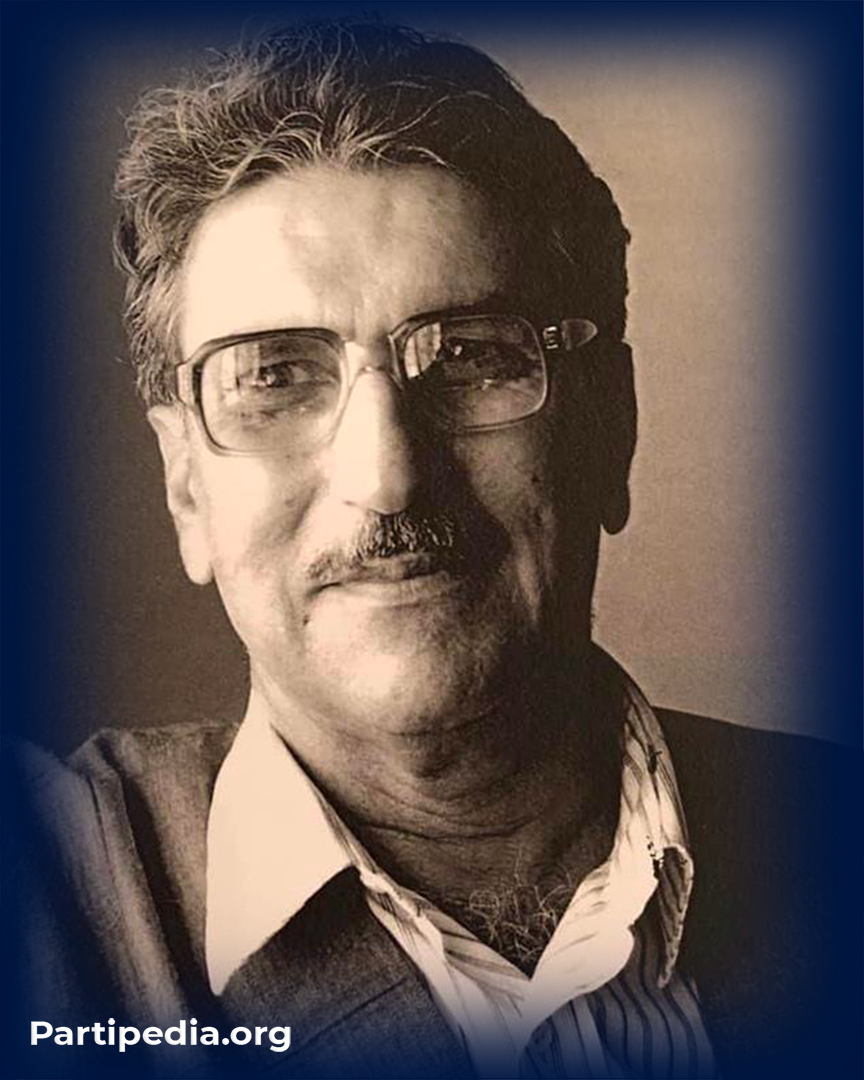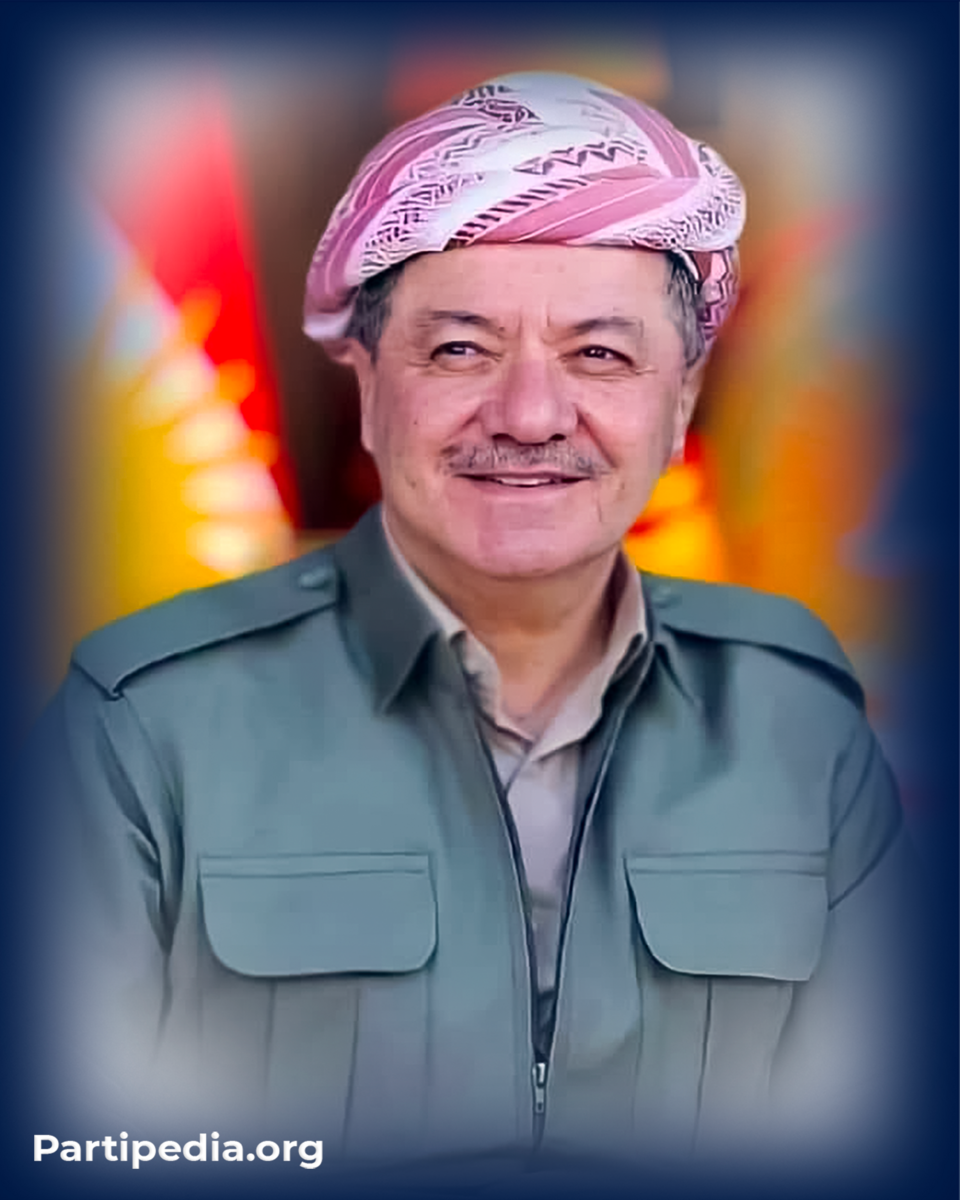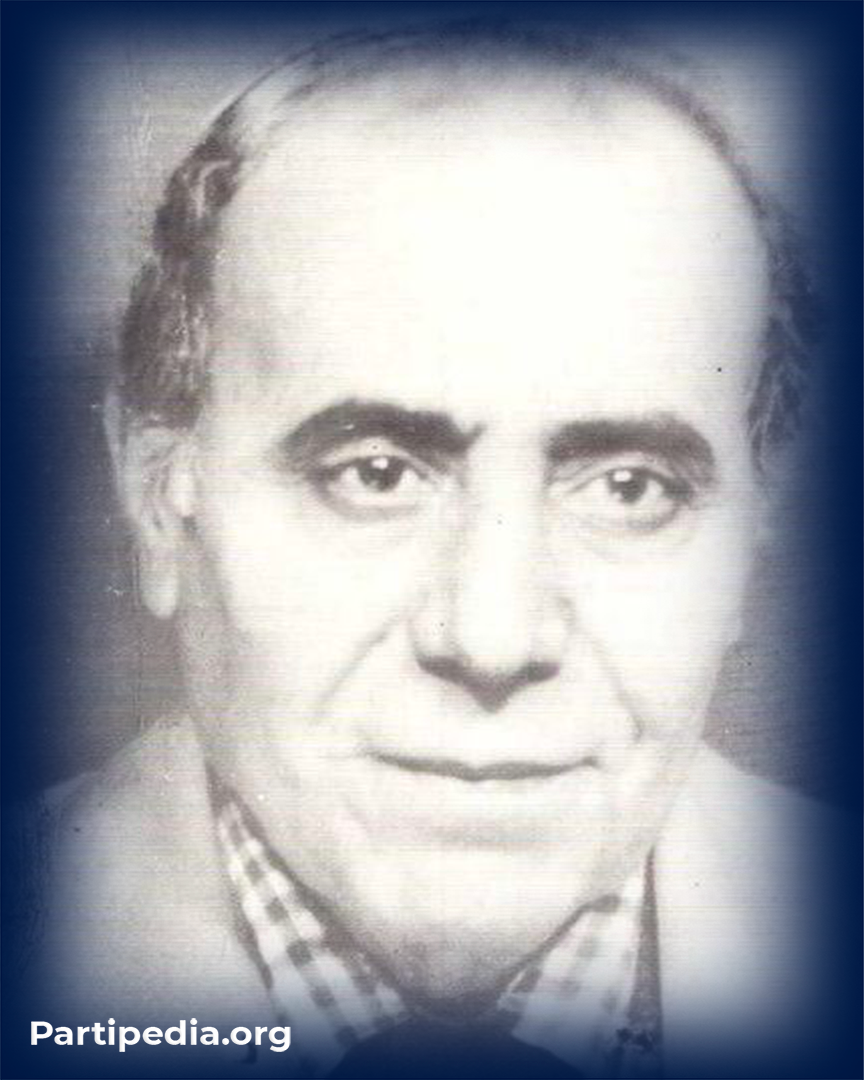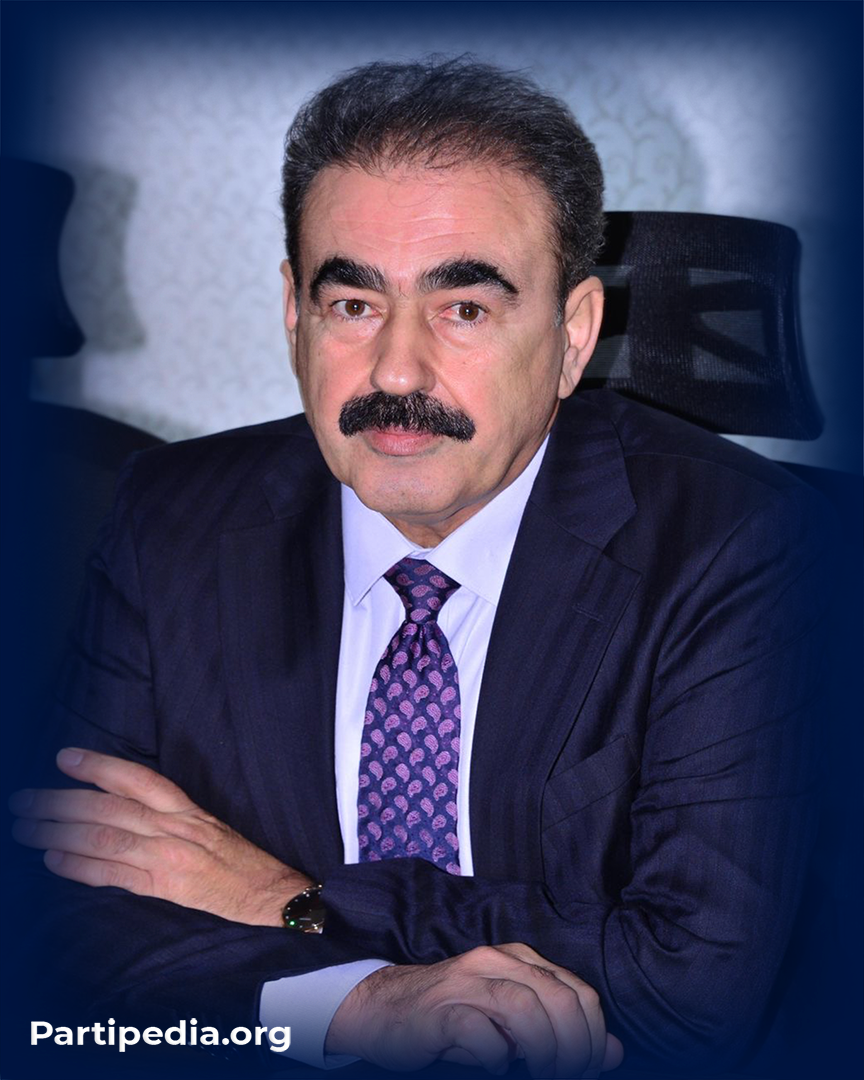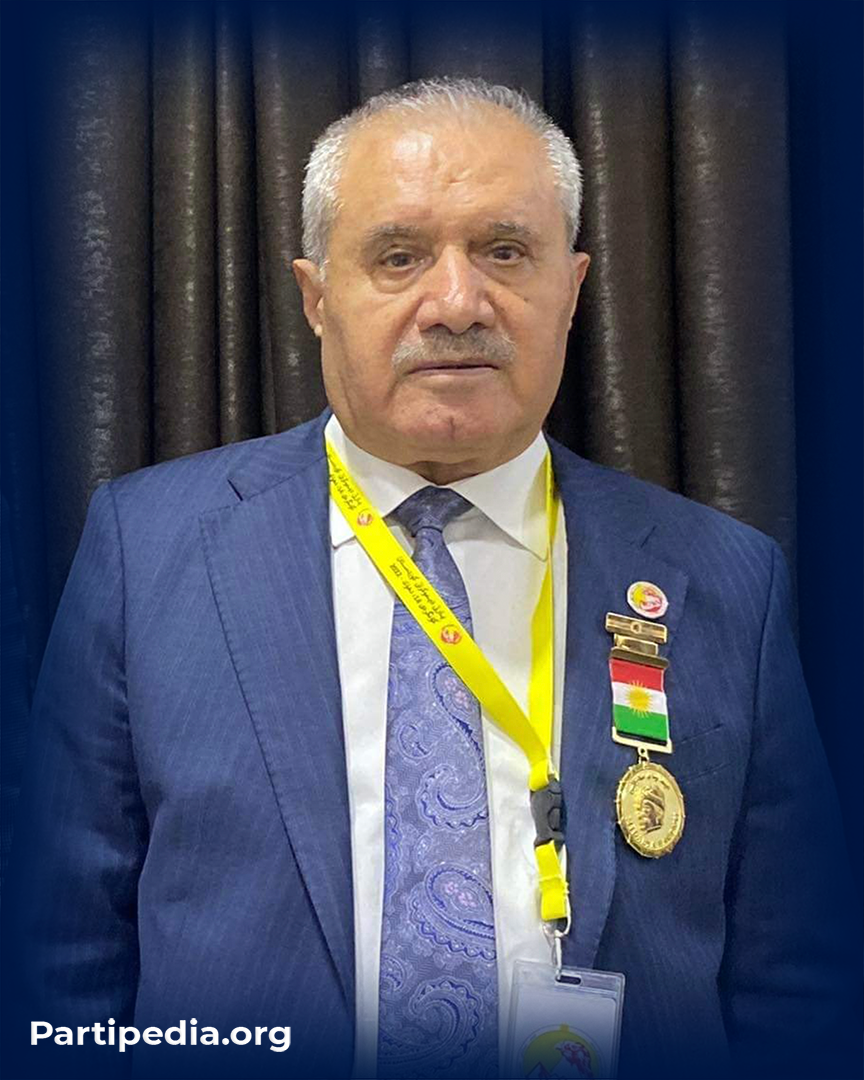An Engineer and politician, Mohammed Mahmoud Abdulrahman Khadr, also known as Sami, Sami Abdulrahman, Salih, and Dara, was a member of the Kurdish Students Association in Europe in 1957. In 1966, he became a member of the leadership council of the Iraqi Kurdistan Revolution. At both, the Seventh (1966) and Eighth (1970) Congresses, he was elected as a member of the Central Committee and later as a member of the Political Bureau of the Kurdistan Democratic Party (KDP). In 1975, he was a member of the interim leadership of the KDP. In 1979, he left the KDP at its ninth congress. In 1981, he founded the Kurdistan People's Democratic Party (KDP). In 1993, he returned to the ranks of the KDP and was elected a member of the Central Committee and later a member of the leadership council of KDP at the 11th (1993) and 12th (1999) congresses. He was martyred on February 1, 2004, in a terrorist attack inside the headquarters of the second branch of KDP in Erbil.
Biography
Mohammed Mahmoud Abdulrahman was born in 1933 in Mosul. In 1952, he was sent as a government envoy to the United Kingdom. In 1953, he was admitted to the University of Manchester. In 1957, he received a master's degree in electrical engineering and returned to Iraq. In 1958, he was employed as an engineer in the Ministry of Oil. In the same year, he was one of the founders of the Iraqi Union of Engineers. In 1959, he was elected secretary of the Iraqi Union of Engineers. In 1959, he was the second reserve officer in Mosul. During the uprising of Colonel Rukan Abdul Wahab Shawaf (1016-1959), he supported Zaim Rukan Abdul Karim Qasim (1963) and stood against the uprising of Colonel Abdul Wahab Shawaf. In 1961, he married his cousin Fawzia Amin Abdul Rahman. He was martyred in a terrorist attack in Erbil on February 1, 2004 by al-Qaeda terrorist group. He was fluent in Kurdish, Arabic, and English.
Sami’s Striving Record
In 1954, when he was a student in the Kingdom of Great Britain, he worked in the Iraqi Students Association of the Iraqi Communist Party and was elected to the board of directors of the Iraqi Communist Party Students at the University of Manchester. In 1957, he was admitted as a member of the Kurdish Students Association in Europe. In the fifties of the twentieth century, he was head of the Iraqi Communist Party in the Kingdom of Great Britain.
After the coup and the expulsion of the Communists, on February 8, 1963, he joined the Peshmerga forces, he started his career as a journalist and was a member of the writers' board of the Voice of Iraqi Kurdistan station, which broadcasted from Gardarashi Cave in Sulaimani province. In 1965, he was a member of the editorial board of the newspaper Khabati, the organ of the Kurdistan Democratic Party. In the same year, he was appointed as the head of the Voice of Kurdistan radio station.
On August 1, 1966, he was appointed as a member of the Revolutionary Leadership Council in Iraqi Kurdistan and later became a member of the Executive Bureau of the Revolutionary Leadership Council in Iraqi Kurdistan. He was elected as a member of the Central Committee and later the Political Bureau of the KDP at both its seventh (1966) and eighth (1970) congresses. In the same year, he became the assistant of the head of the military bureau of the Executive Office of the Revolutionary Leadership Council in Iraqi Kurdistan. At the same time, he was appointed a member of the Foreign Relations Committee of the Executive Office of the Revolutionary Leadership Council of Kurdistan of Iraq. On 15 April 1967, under the leadership of President Mustafa Barzani as a member of the Political Bureau of the KDP, he represented the military-political conference in Kani Smaq.
Since the late 1960s, he has been involved in training cadres and he served as a teacher of the training courses.
He had an influential role as a military leader, and he was leading the Battle of Piramagrun on November 18, 1969, and the Battle of Surdashi at the end of the same year. On March 1, 1969, he was appointed as the commander-in-chief of the operation to attack the Kirkuk Oil Company in Babagurgur.
Due to his familiarity with political and diplomatic striving, his abilities and skills were relied upon at the right times and places, which is why in 1970, he was a member of the seven-member peace committee between the KDP and the Ba'athist Arab Socialist Party. On December 10, 1970, he was a member of the nine-member delegation of the KDP to negotiate autonomy for South Kurdistan with Ba'ath Party officials in Baghdad. On March 11, 1970, he was a member of the KDP delegation for the proclamation of the March 11 Agreement for the Right to Autonomy of Kurdistan by President Ahmad Hassan Bakr (1914-1982).
On March 29, 1970, he was appointed as the minister of Northern Affairs in Ahmed Hassan's cabinet. On August 7, 1970, he was accompanied by Ismail Aziz Mustafa (1938-2017), also known as Sheikh Ismail Mullah Aziz, the deputy of the fifth branch of the Kurdistan Democratic Party, he visited President Mustafa Barzani at the summer headquarters in Haji Omeran in order to rejoin the ranks of the KDP.
On March 12, 1974, he submitted his resignation to Iraqi President Ahmad Hassan Bakr on the occasion of the failure of the Iraqi government to implement the March 11 agreement. On April 7, 1974, by a republican decree, he was removed from his position as the minister of northern affairs in Ahmed Hassan Bakr's cabinet. On April 28, 1974, after the seizure of his house by the Iraqi government, his family was deported to the liberated areas. In early March 1974, for a short period, he was appointed head of the General Secretariat of Education and Higher Education of the September Revolution. In 1974, when the war between the Iraqi Army and the Kurdistan Revolutionary Army began, he was appointed as the head of the media.
In 1975, after the collapse of the September Revolution, he moved to Iran as a refugee and shortly thereafter moved to the UK. In early April 1975, he was appointed by Comrade Massoud Barzani to prepare for the May Revolution. In 1976, he became a member of the interim leadership of the KDP (Berlin Conference).
In 1977, he rejoined the ranks of the Peshmerga forces through North Kurdistan with the help of the Kurdistan Democratic Party of Turkey and strived under the pseudonym Salih and later Dara. In 1977, he delivered the opening speech on Iraqi Kurdistan Radio in the liberated areas of the May Revolution. On November 15, 1977, he participated in the meeting of the interim leadership of the KDP to reorganize the Peshmerga forces and revive the organizations.
He was appointed as the interim secretary of the interim leadership of the KDP until the ninth Congress. He was arrested in 1979 by the authorities of the Islamic Republic of Iran and did not participate in the 9th Congress of the KDP. In 1979, President Massoud Barzani, Idris Barzani, and Wesley Gryk, head of the refugee protection department of the High Commission for Refugees and the Libyan People's Republic tried to liberate him from the Islamic Republic of Iran. In late September 1980, he was released from prison in the Islamic Republic of Iran and returned to the UK.
In 1981, he founded the Kurdistan People's Democratic Party. From 26 to 30 July 1981, in the first congress of the Kurdistan People's Democratic Party, he was elected as the general secretary of the Kurdistan People’s Democratic party by the congress delegates. In 1992, by the delegates of the first congress of the Kurdistan Unity Party, he was elected as a member of the central committee and became a member of the presidency of the Kurdistan Unity Party (PASOK), HSK, and People.
In 1993, at the eleventh congress, he became a member of the Political Bureau of the KDP-United. On May 4, 1994, In the meeting of the KDP and the Patriotic Union of Kurdistan (PUK), he signed a ceasefire agreement to normalize the situation in South Kurdistan.
On 20 December 1999, he was sworn in before the Kurdistan National Assembly and was appointed Deputy Prime Minister of the Kurdistan Regional Government in the fourth cabinet.
In 1999, at the 12th Congress, he was re-elected as a member of the Political Bureau of the KDP.
On August 12, 2003, he was appointed by the Iraqi ruling council as a member of the committee to elect members of the Constitutional Congress. In 2003, he was appointed as a member of the Iraqi Constitution Drafting Committee.
On February 1, 2004, he was martyred in a terrorist attack by the terrorist group Al-Qaeda in Erbil. President Massoud Barzani sent a letter of condolences to the Kurdish people on this occasion. On Tuesday, February 3, 2004, Nechirvan Idris Mustafa, also known as Nechirvan Barzani, Prime Minister of the Kurdistan Region of Iraq, sent a letter of condolences to the Kurdish people, on the occasion of the martyrdom of the Secretary of the Political Bureau of the Kurdistan Democratic Party and the deputy of the prime minister of the Kurdistan Region.
His Works:
Journey to the Burning Land -1988.
Beginnings and Horizons -1988.
From my Papers -1991.
The World is Waiting for the Kurdish Peace (Arabic) translated into Kurdish under the title “The World is Waiting for Kurdish Peace(Kurdish)-1998
Diplomatic Ceremonies, Dialogue and Negotiations (Arabic) translated into Kurdish under the title: “Diplomatic Ceremonies, Dialogue, and Negotiations” (Kurdish)- 1998
About the Diplomacy of the Kurdistan Democratic Party-1999
Cadre Training - no years.
About the Diplomacy of the Kurdistan Democratic Party-1999.
Sources:
-
علي سنجاري، القضیة الكوردیة وحزب البعث العربي الأشتراكي في العراق، الجزء الثالث، (دهوك ـ مطبعة خاني ـ ٢٠١٢م).
-
مێژووی پارتی دیموکراتی کوردستان، كۆنگره و كۆنفرانس (پرۆگرام و پهیڕهوی ناوخۆ)، دهستهی ئینسكلۆپیدیای پارتی دیموکراتی کوردستان، بهرگی یهكهم، (ههولێر- چاپخانهی رۆكسانا- ٢٠٢١).
-
حبیب محمد كریم، كركوك و ثورة أیلول المجیدة، مجلة گولان العربي، مركز گولان الثقافي، العدد ٧٠، السنة السادسة، أربیل، مطبعة وزارة التربیة، ٣١ آذار ٢٠٠٢م.
-
نوزاد علي احمد، صحافة الحزب الدیمقراطي الكردستاني خارج الوطن، (السلیمانیة ـ مؤسسة ژین لاحیاء التراث الوثائقي والصحفي الكردي ـ ٢٠١٠م).
-
پاڵه باوانی، كهسایهتی شههید سامی و چهند بیرهوهرییهك، گۆڤاری خازر، سهنتهری ڕۆشنبیری بهردهڕهش، ژماره ٩، ههولێر، چاپخانهی مناره، بههاری ٢٠٠٥ز.
-
ئـ.د.ئـ، فایلی ژماره A٢-B-٢٧١، شههید محهمهد مهحمود عهبدولڕهحمان ناسراو به سامی عهبدولڕهحمان، ئامادهكار سوبحی مهحمود كلكه، ههولێر، ١٢ نیسانی ٢٠١٥ز.
-
ئامادهكردن و ساغكردنهوهی : شهریف ههژاری، جوڵانهوهی نهتهوهیی باشووری كوردستان ١٩٦١ ـ ١٩٧٧ له بهڵگهنامه نهێنیهكانی وهزارهتی دهرهوهی بهریتانیادا، وهرگێڕانی پاسار شێركۆ، (سلێمانی ـ چاپخانهی پهنجهره ـ ٢٠١٦ز).
-
محمد سهل طقوش، تاریخ الأكراد ٦٣٧ ـ ٢٠١٥، ( بیروت ـ دار النفائس للطباعة والنشر والتوزیع ـ ٢٠١٥م).
-
حامید گهوههری، مستهفا بارزانی پێشمهرگه و سهرۆك، (ههولێر ـ چاپخانهی ڕۆژههڵات ـ ٢٠١٧ز).
-
حبیب محمد كریم، تأریخ الحزب الدیمقراطي الكوردستاني ـ العراق (في محطات رئیسیة) ١٩٤٦ ـ ١٩٩٣، (دهوك ـ مطبعة خهبات ـ ١٩٩٨م).
-
سامي شورش، كردستان والأكراد، الطبعة الثانیة، (أربیل ـ مطبعة روژههلات ـ ٢٠١٩م).
-
سامي عبدالرحمن، من أوراقي، (كوردستان ـ منشورات حزب الشعب الدیمقراطي الكردستاني ـ مطبعة گهل ـ ١٩٩١م).
-
علي سنجاري، القضیة الكوردیة وحزب البعث العربي الاشتراكي في العراق، الجزء الثالث، (دهوك ـ مطبعة خاني ـ ٢٠١٢م).
-
علي سنجاري، حقیقة مسیرة ثورة ١١ أیلول ١٩٦١، (دهوك ـ مطبعة خاني ـ ٢٠١٣م).
-
عهڤدرهحمان گوندكی، نامهیهك ل شرنهخێ، (ئستانبۆل ـ وهشان خانهیا دۆز ـ ٢٠١٦ز).
-
كهریم شارهزا، سیاسهتمهداری كورد شههید سامی عهبدولڕهحمان، قامووسی ناوه نهمرهكان، بهرگی یهكهم، ئاماده كردن و سهرپهرشتی مومتاز حهیدهری، هێرش سنجاوی و كاروان قاسم، (ههولێر ـ كتیبخانه و ئهرشیفی مومتاز حهیدهری ـ چاپخانهی ڕۆژههڵات ـ ٢٠١٤ز).
-
محهمهد مهلا قادر، خهباتنامه كورته مێژووی پارتی و كولتووری بارزانی نهمر، چاپی دووهم، (ههولێر ـ دهزگای چاپ و بڵاوكردنهوهی ئاراس ـ ٢٠٠٧ز).
-
مسعود البارزاني، البارزاني والحركة التحرریة الكردیة، المجلد الثالث، الطبعة الثانیة، (أربیل ـ مطبعة وزارة التربیة ـ ٢٠٠٢م).




